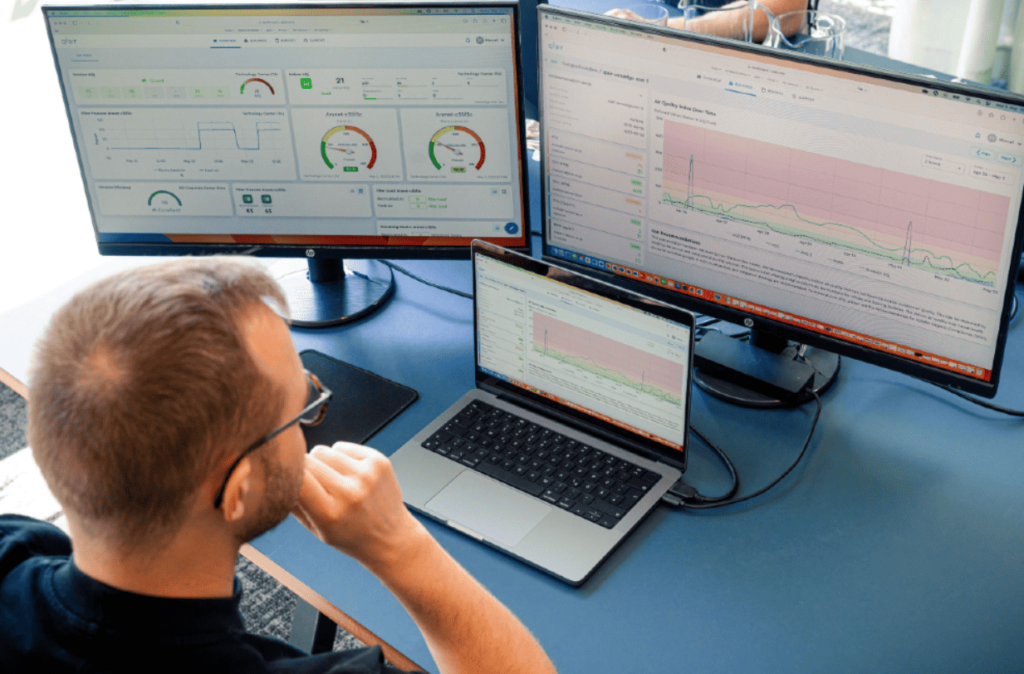— A path to operational excellence, energy efficiency, and high indoor air quality.
In today’s world, where indoor air quality and sustainable buildings are of paramount importance, it is crucial to adopt innovative technologies that can enhance operational excellence, energy efficiency, and maintain high indoor air quality.
One such technology that plays a significant role in achieving these goals is digital air filter monitoring in air handling units (AHUs). By leveraging the power of real-time data and advanced analytics, digital air filter monitoring revolutionises the way we manage air filtration systems.
In this article, we will explore why digital air filter monitoring is essential for facility and maintenance managers to optimise operational efficiency, reducing energy consumption, and ensuring superior indoor air quality.
Enhancing Operational Excellence
Traditional filter management relies on manual inspection and maintenance schedules. Facility managers and maintenance personnel must physically inspect each filter to assess its condition and determine if replacement is necessary. This process is time-consuming and prone to human error.
Digital air filter monitoring empowers facility managers and maintenance personnel with real-time insights into the condition of air filters. By continuously monitoring the performance and efficiency of air filters, potential issues can be identified and addressed promptly. The proactive nature of digital monitoring helps prevent unexpected breakdowns, reduces downtime, and improves overall system reliability. Moreover, it enables predictive maintenance, allowing for optimised scheduling of filter replacements and reducing unnecessary labor costs.

Improving Energy Efficiency
Inefficient air filtration systems can significantly impact energy consumption and operational costs. Clogged or dirty filters create additional resistance in the airflow, forcing the HVAC system to work harder, leading to increased energy consumption. With digital air filter monitoring, anomalies and deviations in filter performance are detected early on, ensuring timely maintenance and replacement.
By keeping the air filters clean and functioning optimally, energy wastage is minimised, resulting in substantial energy savings and reduced carbon footprint.
Ensuring High Indoor Air Quality
Indoor air quality directly affects occupants’ health, comfort, and productivity. Traditional approaches of relying on visual inspections or fixed maintenance schedules may result in inadequate filtration, allowing contaminants to circulate freely. Digital air filter monitoring provides a continuous assessment of the air filters’ condition, allowing for timely replacement and maintenance.
This helps maintain a clean and healthy indoor environment by reducing the presence of allergens, pollutants, and other harmful particles in the air. By ensuring high indoor air quality, organisations can create a safer and more productive environment for their occupants.
Retroffiting existing buildings
The implementation of a digital air filter monitoring system is incredibly valuable when retrofitting existing buildings. By incorporating a digital monitoring system, facility managers can enhance the efficiency of filter management without the need for extensive modifications to the building’s infrastructure.
The system can be easily integrated into the existing HVAC system, providing real-time insights into filter performance and enabling proactive maintenance. With the ability to monitor and analyse data remotely, facility managers can make informed decisions, allocate resources effectively, and maximise the return on investment in retrofitting projects for existing buildings.
—
Marcel Werle holds the position of Head of Business Development at qlair Europe. qlair, a corporate startup under the Mann+Hummel group, is dedicated to empowering facility managers to create more sustainable, efficient, and healthier buildings.


